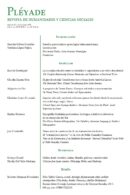Notes on the Construction of an Intellective Instrument. “Internal Colonialism” in the Work of Pablo González Casanova

Published 2018-07-22
Keywords
- Pablo González Casanova,
- Rodolfo Stavenhagen,
- Internal Colonialism,
- Intellectual Itineraries,
- Latin American Sociology
How to Cite

This work is licensed under a Creative Commons Attribution-NonCommercial 4.0 International License.
Abstract
The article describes the development of the concept of “internal colonialism” at two levels. At the institutional level, the relationship of two sociological traditions –the Brazilian and the Mexican– is pointed out, from the events that led to the journal América Latina of the Latin- American Research Center in Social Sciences (CLAPCS) to publish, in 1963 and in separate fascicles, the texts in which those contributions were conveyed. On the other hand, it retrieves the intellectual itineraries of two Mexican social scientists –Pablo González Casanova and Rodolfo Stavenhagen–, each with a solid formation in prestigious foreign institutions. It is described how the former incorporates the notion of “internal colonialism” to his work, as well as the conditions posed for a necessary redefinition of its scope, with the aim to seek a better understanding of elements of capitalism’s restructuration that are decisive for politics and states in the transition to the XXI century.